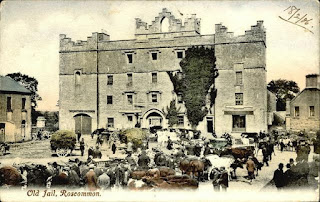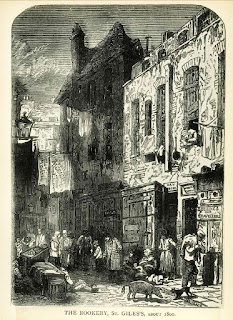Frost on Her Soul: History's Most Infamous Female Executioner and the Lore and Legend of Lady Betty
Sometime in the 1780’s, just after America had won its hard fought independence from Great Britain, a young Irishman returned home after several years abroad fighting with George Washington’s Continental Army.
He had gone to the rebellious colonies several years before as little more than a boy, seeking to escape grinding poverty and an overbearing and mentally unstable mother back home in County Roscommon, Ireland. While in America he had fought bravely; saved all of his money and grown into a man.
Elizabeth Sugrue, the returning soldier’s estranged mother, was destitute and desperate. Her husband, a hard-scrabble, abusive alcoholic and subsistence farmer had died unexpectedly several years before; her son had left home as a runaway for parts unknown and she had taken to drinking, petty theft and prostitution to survive. She ran a boarding house in Roscommon city, which as all local residents knew, was in actuality little more than a thinly disguised brothel.
An unknown and well dressed young man with a large trunk showed up one night unexpectedly at Elizabeth Sugrue’s boarding-house seeking only lodging and not sexual favors. He paid for his room in cash and didn’t reveal his identity. When Elizabeth Sugrue asked where he had come from the man replied only that, “He had been to America seeking his fortune.”
Thinking that this mystery man had, in fact, found his fortune in America and had it hidden in his trunk, Elizabeth Sugrue in the middle of the night barged into the upstairs room where the young man lay asleep, and repeatedly stabbed him through the heart with a large knife.
Her plan was to take the money, the supposed fortune that the man had with him, and flee Roscommon before the sun rose. She was going to use the money she stole to start a new life somewhere else and free herself from the vicious cycle of addiction and prostitution that she was now trapped in.
But as Elizabeth rummaged through the man’s trunk she came upon his discharge papers from the Continental Army of the United States of America and read the name--Patrick Sugrue!
Elizabeth Sugrue had unknowingly murdered her own son in cold blood.
In the middle of the night, covered in her own son’s blood, she ran into the middle of the street, fell to her knees and screamed, “Oh my God! What have I done!”
Elizabeth Sugrue was arrested and thrown into the Roscommon jail. Her sentence was death by hanging.
 |
| The Roscommon Jail which still stands today |
Roscommon County historian William Wilde wrote that on the day of Elizabeth’s execution, “Alongside the usual dockful of sheep stealers, shoplifters, Whiteboys and cattle-houghers, Elizabeth Sugrue stood awaiting the hangman’s noose.”
But there was no executioner available that day at the Roscommon jail, history does not tell us exactly why, but in an ironic twist of fate Elizabeth Sugrue agreed to “release the drop” and hang her fellow inmates in return for a commutation of her own sentence.
Another Victorian Era Irish historian and journalist, an enterprising and brilliant writer who was determined to keep the memory of history’s down-trodden, exploited and forgotten women alive named Charlotte O’Connor Eccles reported that Elizabeth pleaded her case with the judge from the very gallows saying, “Spare me life your Honor, spare me life and I’ll hang ‘em all.”
In the same biographical work on Sugrue that O’Connor Eccles wrote in 1884, relying on secondhand sources and local tradition to report on events nearly a century in the past she said of Sugrue that, “she had been crushed by grinding poverty and hopelessness,” and that, “the privation had seemed to act like frost on her soul.”
 |
| 18th Century Gibbeting |
It does seem odd that a judge would give a condemned inmate the authority to perform executions in the absence of a proper hangman, especially if she was a woman, but in William Wilde’s work on Elizabeth Sugrue quoted above he referenced the presence of “Whiteboys” on the gallows. As best as I can tell, “Whiteboys” may reference members of a secret society, most probably freemasons who were so named because of the white aprons that they wore during their ceremonies, or it could reference Catholic priests convicted of some heinous crime and perhaps no one else was willing to execute members of such a powerful fraternal organization, or holy members of the Irish Catholic church out of fear of retribution either earthly, or Divine, and so into that void stepped the desperate and hopeless Elizabeth Sugrue.
Anyway, thus began the infamous and tragic history of Elizabeth Sugrue known in Irish folklore and legend as “Lady Betty”. At least we think it does, or at least so the legend tells us.
There was, in fact, definitely a woman in Roscommon County, Ireland known as Elizabeth Sugrue who lived there during the late 18th century, though even her birth year is debatable with some historians and folklorists believing she was born in 1740 and others saying she was born in 1750. It is generally agreed upon that she died sometime a few years after 1800. She is famous in history, not for the murder of her own son which may or may not be an apocryphal story to begin with, but she came to be known as “Lady Betty” because Elizabeth Sugrue is supposedly history’s most prolific female executioner.
In Roscommon town Ireland hangings took place on an elevated wooden gallows that was three storeys high--high enough for all the townspeople to gather and see. This meant that anyone, but particularly a woman, who acted as an executioner was sure enough to become an instant local celebrity, albeit an infamous one.
Hangings performed by Elizabeth Sugrue were said by historians Wilde and Eccles who gathered testimony from locals who had heard much of their information from parents and grandparents were said to draw tens of thousands of spectators.
And on occasion Ms. Sugrue, the woman that residents of Roscommon called “Lady Betty” performed floggings and displayed the rotting corpses of condemned criminals for all to see.
 |
| William Wilde |
According to William Wilde’s account of Sugrue’s life a gibbeting of one condemned man named Michael Walsh who was accused of shooting another man during a robbery gone bad supposedly drew a crowd of over 30,000 spectators who showed up to watch Sugrue perform the execution.
Walsh’s body was then left to rot, hanging in the open air for days, until it eventually was taken down and paraded in an open cart by none other than Elizabeth Sugrue herself for all in the town of Roscommon to see.
Court records in Roscommon indicate that Elizabeth Sugrue, the world’s most prolific female executioner performed regular hangings outside the Roscommon jail until the year 1802 when she received a full pardon for her crimes due her so-called “service” to the community.
Most sources agree that Elizabeth Sugrue died sometime around the year 1807 but to this very day the exact date of Elizabeth’s death, just like her birth year, is unknown.
 |
| Charlotte O'Connor-Eccles |
Years after her death, local newspapers in Ireland began to report that Elizabeth Sugure, the executioner of Roscommon had been a woman of means, and one of aristocratic birth, who out of nothing more than a sadistic and macabre desire to kill others had turned her back on the wealthy lifestyle into which she had been born and become, by choice, history’s most notorious hangwoman. But thanks to the enterprising work of folklorists and historians like Charlotte O’Connor-Eccles, who took a more nuanced view based on social history, and who were sympathetic towards the rights of women, some of the record regarding the infamous history behind the life of the woman they called Lady Betty was set straight.
Much still remains shrouded in mystery and folklore when it comes to the story of Elizabeth Sugrue, and undoubtedly future historians particularly those most interested in women's history will one day shed even more light on the life and the tragic story of the woman they called Lady Betty.
To learn more about the life of Elizabeth Sugrue please visit:
https://www.dib.ie/biography/sugrue-elizabeth-lady-betty-a10203




Comments
Post a Comment